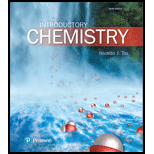
Concept explainers
Sulfur and fluorine react to form sulfur hexafluoride according to the reaction shown here. How many mol of
are required to react completely with 2.55 mol of S?
a. 0.85 mol
b. 2055 mol
c. 7.65 mol
d. 15.3 mol
Interpretation: The number of mol of
Concept Introduction: When mole of one reactant is given, then apply mole–mole stoichiometric relationship between the moles of the reactants.
Answer to Problem 1SAQ
Correct answer: For complete reaction with
Therefore, option (c) is correct.
Explanation of Solution
Reason for correct option:
The reaction is given as follows:
From the above chemical reaction, it is clear that 1 mole of
Thus, to calculate the moles of fluorine from the given moles of sulfur, the conversion factor used will be
Multiply the conversion factor with the given
Hence
As the given value is in three significant figures, the final answer should also be in three significant figures. Therefore, the final answer will be
Hence, option (c) is correct.
Reasons for incorrect options:
Option (a) is incorrect because according to the above calculation,
Option (b) is incorrect because according to the above calculation,
Option (d) is incorrect because according to the above calculation,
Hence, options (a), (b), and (d) are incorrect.
Want to see more full solutions like this?
Chapter 8 Solutions
Introductory Chemistry (6th Edition)
- I have some reactions here for which I need to predict the products. Can you help me solve them and rewrite the equations, as well as identify the type of reaction? Please explain it to me.I have some reactions here for which I need to predict the products. Can you help me solve them and rewrite the equations, as well as identify the type of reaction? Please explain it to marrow_forwardDraw the major product of this reaction. Ignore inorganic byproducts. Problem 17 of 35 1. CH3CH2Li O H 2. Neutralizing work-up @ Atoms, Bonds and Rings Draw or tap a new boarrow_forwardWill this convert the C=O to an alcohol? Or does its participation in the carboxy group prevent that from happening?arrow_forward
- I have some reactions here for which I need to predict the products. Can you help me solve them and rewrite the equations, as well as identify the type of reaction? Please explain it to me.I have some reactions here for which I need to predict the products. Can you help me solve them and rewrite the equations, as well as identify the type of reaction? Please explain it to marrow_forwardDon't used hand raiting and don't used Ai solutionarrow_forwardCould you explain and label how this was determined for the functional groups? Please highlight the areas and show me as well.arrow_forward
- I want to know how to do it , please helparrow_forwardHelp me i dont know how to do itarrow_forwardCan you explain how to draw a molecular orbital diagram for the given molecule? It is quite difficult to understand. Additionally, could you provide a clearer illustration? Furthermore, please explain how to draw molecular orbital diagrams for any other given molecule or compound as well.arrow_forward
- Curved arrows are used to illustrate the flow of electrons. Using the provided starting and product structures, draw the curved electron-pushing arrows for the following reaction or mechanistic step(s). Be sure to account for all bond-breaking and bond-making steps. Prob 10: Select to Add Arrows THEarrow_forwardCurved arrows are used to illustrate the flow of electrons using the provided starting and product structures draw the curved electron pushing arrows for the following reaction or mechanistic steps Ether(solvent)arrow_forwardThis deals with synthetic organic chemistry. Please fill in the blanks appropriately.arrow_forward
 Chemistry for Engineering StudentsChemistryISBN:9781337398909Author:Lawrence S. Brown, Tom HolmePublisher:Cengage Learning
Chemistry for Engineering StudentsChemistryISBN:9781337398909Author:Lawrence S. Brown, Tom HolmePublisher:Cengage Learning Introductory Chemistry: A FoundationChemistryISBN:9781337399425Author:Steven S. Zumdahl, Donald J. DeCostePublisher:Cengage Learning
Introductory Chemistry: A FoundationChemistryISBN:9781337399425Author:Steven S. Zumdahl, Donald J. DeCostePublisher:Cengage Learning Chemistry & Chemical ReactivityChemistryISBN:9781133949640Author:John C. Kotz, Paul M. Treichel, John Townsend, David TreichelPublisher:Cengage Learning
Chemistry & Chemical ReactivityChemistryISBN:9781133949640Author:John C. Kotz, Paul M. Treichel, John Townsend, David TreichelPublisher:Cengage Learning Chemistry by OpenStax (2015-05-04)ChemistryISBN:9781938168390Author:Klaus Theopold, Richard H Langley, Paul Flowers, William R. Robinson, Mark BlaserPublisher:OpenStax
Chemistry by OpenStax (2015-05-04)ChemistryISBN:9781938168390Author:Klaus Theopold, Richard H Langley, Paul Flowers, William R. Robinson, Mark BlaserPublisher:OpenStax Chemistry: The Molecular ScienceChemistryISBN:9781285199047Author:John W. Moore, Conrad L. StanitskiPublisher:Cengage Learning
Chemistry: The Molecular ScienceChemistryISBN:9781285199047Author:John W. Moore, Conrad L. StanitskiPublisher:Cengage Learning ChemistryChemistryISBN:9781305957404Author:Steven S. Zumdahl, Susan A. Zumdahl, Donald J. DeCostePublisher:Cengage Learning
ChemistryChemistryISBN:9781305957404Author:Steven S. Zumdahl, Susan A. Zumdahl, Donald J. DeCostePublisher:Cengage Learning





